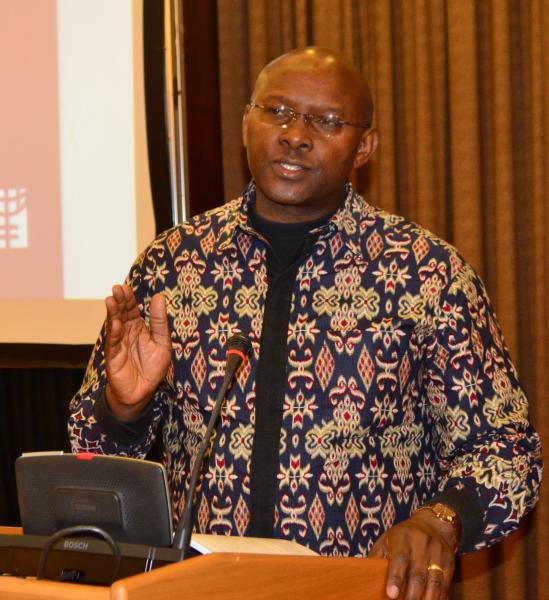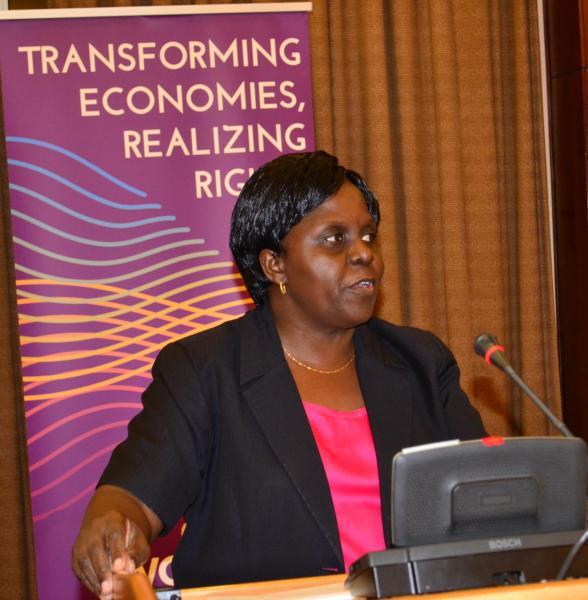
Uganda has launched a flagship report highlighting the progress of women globally. The report titled; “Progress of the World’s Women 2015-2016: Transforming Economies, Realizing Rights”,  was launched by the State Minister for Gender, Labour and Social Development, Hon. Rukia Nakadama Isanga, at a breakfast meeting held at Kampala Serena Hotel on 19th June, 2015.
was launched by the State Minister for Gender, Labour and Social Development, Hon. Rukia Nakadama Isanga, at a breakfast meeting held at Kampala Serena Hotel on 19th June, 2015.
The report comes out at a time when the global community is defining the Sustainable Development Goals for the post-2015 era. It is also being published as the international community comes together to define a transformative new agenda for sustainable development, 20 years after the landmark Fourth World Conference on Women in Beijing, China, which set out an ambitious agenda to advance gender equality.
The UN Women Flagship report states that although there has been significant progress in increasing women’s access to education, leadership positions, employment and property, the changes have not yet resulted into equal outcomes for women and men. “Globally, three quarters of working age men are in the labour force compared to half of working age women. Among those who are employed, women constitute nearly two thirds of “contributing family workers”, who work in family businesses without any direct pay,” according to the report. The report further indicates that everywhere, women continue to be denied equal pay for work of equal value and are less likely than men to receive a pension, which translates into large income inequalities throughout their lives. It also states that globally, women’s earnings are 24% less than those of men.
The evidence-based report provides ten key recommendations for action that governments and others can take in order to move towards an economy that truly works for women, to the benefit of all.
The recommendations include creating more and better job opportunities for women; reducing occupational segregation and gender pay gaps; strengthening women’s income security throughout the life cycle; recognising, reducing and redistributing unpaid care and domestic work; investing in gender responsive social services; maximising resources for the achievement of substantive equality; supporting women’s organizations to claim rights and share policy agendas at all levels;  creating an enabling global environment for the realisation of women’s rights; use of human rights standards to shape policies and catalyse change as well as generating evidence to assess progress on Women’s economic and social rights.
creating an enabling global environment for the realisation of women’s rights; use of human rights standards to shape policies and catalyse change as well as generating evidence to assess progress on Women’s economic and social rights.
The report focuses on the economic and social dimensions of gender equality, including the right of all women to a good job, with fair pay and safe working conditions; adequate pension in older age, right to health care and safe water, without discrimination based on factors such as socio-economic status, geographic location and race or ethnicity.
Commenting on the report, Dr Sarah Ssewanyana from the Economic Policy Research Centre who focused on the creation of an enabling macroeconomic environment emphasized the need to discuss the report within the Ugandan context.
Although the report highlights the need to bridge inequality, Dr. Ssewanyana argued that it will always be there, and it cannot be avoided by countries in initial stages of development. Giving an example on how the linkage between social policies and macroeconomic policies has contributed to transformation in other countries, Dr. Ssewanyana advised policy makers in Uganda to emulate the good practice.She also called for more evidence-based research for monitoring the progress on women issues.
Another panellist, Mr Richard Ssewakiryanga, Executive Director of the Uganda National NGO Forum, noted that lack of social protection is a challenge that has to be addressed.
“If social policies are to be effective in Uganda, we must deal with the ever increasing population. The ever increasing population is erasing away the effect of social protection policies and services,” he advised.
He emphasized the need to route social policy within the framework of human rights. “Human rights are key to achieving prosperity. Growth not driven by framework of rights cannot be realised,” he said. He called for the creation of child care services for children to grow in secure environments.
In her remarks on transforming work for women’s rights, the Head, Budget Monitoring and Accountability Unit at the Ministry of Finance, Planning and Economic Development, Ms. Margret Kakande, noted that women’s employment is largely limited by unpaid care work. She reiterated the fact that unequal outcomes for women in the labour market are the biggest contribution to their overall socio economic disadvantage. She appealed for improved pay for teachers, health workers and women in the informal sector. She also implored women to enrol into professional courses for increased economic empowerment. “Without economic empowerment of women, gender equality cannot be realised,” she explained.
Ms Kakande called for the provision of child care services at points of work as a way of increasing women’s productivity.
 Addressing participants, the Head of Delegation, European Union, H.E Ambassador Kristian Schmidt, said the report was a testament to injustices experienced by women globally. He said Europe is a strong global advocate for gender equality and women’s empowerment. “We have pushed hard, whether at the Beijing or Cairo UN conferences, for women’s rights to decide over their bodies, choices, careers and education. This year, as the world is rethinking and recasting its sustainable development models in the context of adopting a universal post 2015 development framework and defining Sustainable Development Goals, the EU is of course pushing for clear and ambitious goals in this area,’’ he said. He described the report as a document with universal significance and resonance for every woman.
Addressing participants, the Head of Delegation, European Union, H.E Ambassador Kristian Schmidt, said the report was a testament to injustices experienced by women globally. He said Europe is a strong global advocate for gender equality and women’s empowerment. “We have pushed hard, whether at the Beijing or Cairo UN conferences, for women’s rights to decide over their bodies, choices, careers and education. This year, as the world is rethinking and recasting its sustainable development models in the context of adopting a universal post 2015 development framework and defining Sustainable Development Goals, the EU is of course pushing for clear and ambitious goals in this area,’’ he said. He described the report as a document with universal significance and resonance for every woman.
H.E Schmidt applauded Uganda for making progress in the struggle for gender equality. Uganda received the AU award for its progress in realising gender equality and women’s human rights in Africa.
The State Minister for Gender, Labour and Social Development, Hon. Rukia Nakadama Isanga, reiterated government’s commitment to take action towards addressing the obstacles to gender equality and empowerment of women and girls. “Uganda’s commitment is reflected in the actions that we have taken to put in place laws, policies, plans, programmes as well as judicial and administrative mechanisms over the years. Our Constitution, Uganda’s Vision 2040, the National Development Plan, the Uganda Gender Policy 2007, the Sector specific gender policies and strategies and the laws to eliminate discrimination, provide for women’s ownership and control over land resources and enforce human rights principles in general are a clear testimony of our commitment to achieving gender equality.
She assured participants that the Ministry of Gender, Labour and Social Development would incorporate the recommendations of the report in the plans and programmes of the Social Development Sector.
UN Women Country Representative, Ms Hodan Addou, noted that the report highlights an economic agenda that will empower women and men globally. She said UN Women continuously advocates for policies that promote women empowerment and gender equality.
The Dean of the School of Women and Gender Studies, Assoc. Prof. Josephine Ahikire, expressed gratitude to UN Women for supporting generation of knowledge on gender issues. “The School of Women and Gender Studies is committed to a vibrant gender knowledge project that provides evidence-based research and capacity building,” she said.
The panel discussion was moderated by Prof. Grace Bantebya from the School of Women and Gender Studies.
The launch was attended by among others Ms Christine Musisi, Regional Director, UN Women, Eastern and Southern Africa who gave an overview of the report. See online version of the report at http://progress.unwomen.org/en/2015/
It was also attended by the Deputy Vice Chancellor, Finance & Administration, Prof. Banarbas Nawangwe, and the Deputy Principal of the College of Humanities and Social Sciences, Prof. Abasi Kiyimba.
